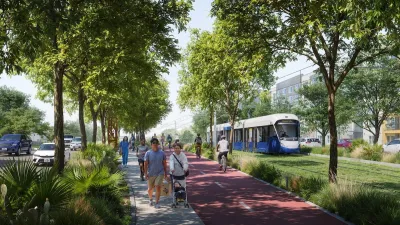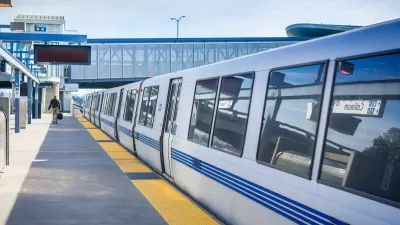BOSTON -- If you've ever studied the bar menu at Trader Vic's then you know about such wonders as Tropical Passion, Moku Nani, and the Potted Parrot. Each is made of a unique but secret blend of dark rum, light rum, spiced rum, tropical juices, and of course "subtle flavorings." But by the time you'd realize that the only real difference is the glass they come in, you're too probably drunk to notice--or care. Minus the palm fronds, the RailVolution conference is much the same.
BOSTON -- If you've ever studied the bar menu at Trader Vic's then you know about such wonders as Tropical Passion, Moku Nani, and the Potted Parrot. Each is made of a unique but secret blend of dark rum, light rum, spiced rum, tropical juices, and of course "subtle flavorings." But by the time you'd realize that the only real difference is the glass they come in, you're too probably drunk to notice--or care.
Minus the palm fronds, the RailVolution conference is much the same.
I could hardly decide which sessions to attend this weekend, at RailVolution's 15th annual installment in Boston, because, in truth, they all sounded like different versions of each other. One the one hand, that's OK. Trains are almost as much fun as cocktails, and the number of speakers testifies to the nation's renewed enthusiasm for rail at all scales. It's still tough, though, to fill 100 workshops, panels, and plenaries without recycling speakers and topics like so much island punch.
What will I learn at "An Intoduction to "Streetcars and Their Role in Building Liveable Communities" that I didn't already find out in "Streetcars and Market Dynamics"? Will I secure more funds if I listen to "Financing the Public Realm" than "Financing Livable Communities"? Who will inspire me more: "Growing Better, Greener, and Denser: Suburban to Urban" or "Creating 'Green' Communities" or "Going Green with Transit: Macro and Micro"? Which of the six sessions featuring New Starts guru Jeff Boothe should I attend? Which of them comes in a scorpion bowl?
These and many other overlaps make it nearly impossible to decide which session to attend, but they testify to the popularity of trail and to the number of advocates who now have something to say -- even if what they're saying isn't necessarily original. Harder to assess is the depth to which these ideas have permeated two key constituencies: the voters and transit bureaucracies who really hold the key to laying track.
RailVolution rightly claims to be one of the leading rail-advocacy events in the country, and for years it, along with all mass-transit advocacy groups, against indifference and cultural inertia at all scales and levels of government. No doubt, innovations are still arising. There are sessions on how transit agencies use social media, and of course there is rampant discussion about the federal stimulus and the Obama Administration's support of rail. I wouldn't say that there's a spirit of optimism at this year's conference, but the good news is that determination is in abundance.
Thanks in no small part to RailVolution itself, which is in its 15th year, rail has gone mainstream and, if we had the funds and a political infrastructure with which to disburse them, plenty of public and private advocates would be laying the tracks for everything from trolleys to national bullet trains. But, as many sessions make all too clear, the time from determination to delivery is going to require patience. In other words, we'll probably be hearing the same stories for years to come.
While the nation was spending the past few decades not building rail, some remarkable coalitions have formed, and once-dismissed ideas have risen into the mainstream. Thanks in large part to our bowtied bartender/conductor, the heroic U.S. Rep. Earl Earl Blumenauer, Republican (j/k!) of Portland, rail is now associated with livability, walkabilty, bikeabilty, gentrification, commerce, real estate development, greening, equity, urban economies, information economies, greening, health, and so much more. These are the ingredients of RailVolution's menu that are becoming so familiar.
Overlapping sermons and tough scheduling choices are perhaps the questions that arise when a movement becomes mature: so many people are in agreement that they are literally saying the same thing. Unfortunately, they'll probably continue to do so for decades to come until of America's hoped-for trains start chugging (including $500 billion estimated by the White House for national high-speed rail).
The best news about RailVolution is that if all goes well, you'll someday be able to have your mai tai and not have to worry about wrecking your car (or bike) if you're foolish enough to try to get home on your own. All aboard for the hangover express!

Alabama: Trump Terminates Settlements for Black Communities Harmed By Raw Sewage
Trump deemed the landmark civil rights agreement “illegal DEI and environmental justice policy.”

Planetizen Federal Action Tracker
A weekly monitor of how Trump’s orders and actions are impacting planners and planning in America.

The 120 Year Old Tiny Home Villages That Sheltered San Francisco’s Earthquake Refugees
More than a century ago, San Francisco mobilized to house thousands of residents displaced by the 1906 earthquake. Could their strategy offer a model for the present?

Rural Missouri Transit Service Could Lose State Funding
OATS Transit offers low-cost rides to primarily elderly rural residents with little or no access to other transportation options.

Opinion: California’s SB 79 Would Improve Housing Affordability and Transit Access
A proposed bill would legalize transit-oriented development statewide.

Record Temperatures Prompt Push for Environmental Justice Bills
Nevada legislators are proposing laws that would mandate heat mitigation measures to protect residents from the impacts of extreme heat.
Urban Design for Planners 1: Software Tools
This six-course series explores essential urban design concepts using open source software and equips planners with the tools they need to participate fully in the urban design process.
Planning for Universal Design
Learn the tools for implementing Universal Design in planning regulations.
Clanton & Associates, Inc.
Jessamine County Fiscal Court
Institute for Housing and Urban Development Studies (IHS)
City of Grandview
Harvard GSD Executive Education
Toledo-Lucas County Plan Commissions
Salt Lake City
NYU Wagner Graduate School of Public Service






























